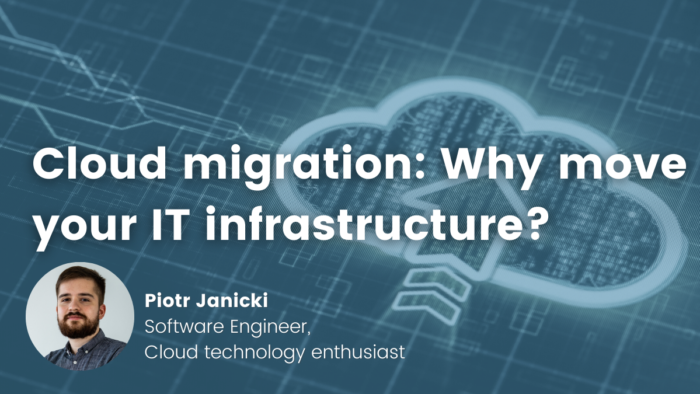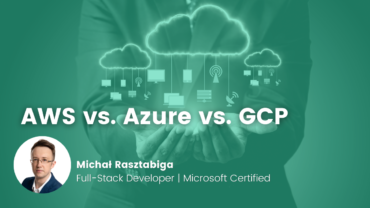- Piotr Janicki
- Read in 6 min.
Cloud migration is the process of moving data, applications or other business elements from an organization’s on-premises to a Cloud Computing environment. It is the process that is important here. Without Cloud migration strategy, you may end up exposing yourself to more costs and problems instead of embracing the benefits it brings.
If you’re not sure whether it’s worth moving your operating systems, then read this article. I’ll tell you all about the pros, but also situations to watch out for when deciding on Cloud migration.
What is Cloud Computing and why is it so popular?
Cloud computing is a model of delivering and accessing computing resources (such as servers, storage, databases, networking, software, analytics and intelligence). It allows organizations to store and process data and run applications remotely, rather than on local servers. The widespread adoption of Cloud Computing happened due to:
- Need for flexible, scalable and on-demand IT resources
- Lower costs compared to traditional on-premises IT solutions
- Increased focus on digital transformation and innovation
- Increased team collaboration
All above factors have made Cloud an attractive option for businesses. Organizations of all sizes, started making it a standard approach for managing and running their IT infrastructure.
Types of Cloud Computing models
It is important to carefully evaluate the specific needs and requirements of your organization to determine the best approach for the Cloud Computing model. You can choose from:
Public Cloud – it is a model where resources, such as servers, storage, and applications, are owned and operated by a third-party Cloud providers. They have been made available to customers over the internet on a pay-per-use or subscription basis. Cloud providers of such a model are: Amazon Web Services (AWS), Microsoft Azure or Google Cloud Platform (GCP).
Private Cloud – Cloud Computing model where the Cloud infrastructure is owned, managed, and operated by a single organization for its own exclusive use. The organization’s IT resources are maintained on-premises or in a dedicated data center and are not shared with other organizations.
Hybrid Cloud – this model combines aspects of public and private Clouds, allowing for a balance between security, control, and cost. Workload, data and applications are seamlessly integrated between the two environments.
The decision which Cloud model to choose should be based on careful evaluation of your business requirements (e.g. security, scalability, cost), but also technical expertise and support needs.
Our team applies knowledge of Cloud Computing concepts, models and services to consult and design the best architecture and solutions for you. If you need help, you can book a quick chat with us here.
Benefits of migrating into the Cloud
Migrating to the Cloud is becoming increasingly important for businesses of all sizes due to the many benefits it offers. Here are the top five reasons why you should consider moving to the Cloud:
Cost savings
Cloud migration can reduce various expenses. Instead of upfront costs for hardware and maintenance, Cloud Computing charges users only for the resources they use. Thanks to that, you can scale up or down as needed, reducing the investment of unused capacity or the need for extra hardware. Also, your own energy consumption is decreased. Cloud providers own and maintain the infrastructure, which allows you to save money on additional IT professionals.
Access to AI/ML solutions
The availability of Cloud AI services has contributed to the popularity of Cloud migration. By providing access to advanced AI and machine learning capabilities, Cloud Computing providers have made it easier for organizations to build and deploy intelligent applications, automate business processes, and derive insights from data. With Cloud migration, organizations can use Cloud AI services such as image recognition, natural language processing, machine learning, and more, which are available as Cloud platform services. Cloud AI solutions are self-learning and can make decisions on their own, freeing up time for human workers to focus on more strategic tasks.
Scalability
Cloud technology allows businesses to scale their computing resources up or down as needed, providing the flexibility to handle changing workloads and the ability to quickly respond to growth. Through APIs and other tools it is simple for businesses to add or remove resources as needed, even without needing specialized technical skills.
Reliable Backup and Recovery
One of the key benefits of Cloud migration is the ability to store data and applications in multiple locations. This reduces the risk of data loss due to hardware failure, natural disasters or other unexpected events. Cloud providers typically offer automatic backup and recovery solutions. This helps ensure that important information is always secure and easily recoverable in the event of an emergency. This is especially important for businesses that rely on critical data for their operations and need to be able to recover quickly and effectively in the case of an outage.
Increased Collaboration
Cloud solutions allow multiple users to access and edit shared documents and data from any location and device. This leads to better collaboration and coordination among team members, reducing the time and effort required to complete projects. Additionally, Cloud solutions typically offer advanced features such as real-time collaboration and version control, which further enhance productivity. By leveraging the Cloud, organizations can streamline their workflows, eliminate downtime, and increase efficiency, leading to higher levels of productivity overall.
When to put your migration plans aside?
Although migrating to the Cloud can bring many benefits, there are some reasons why a company might choose not to. This is why migration should be done only after deep consideration. A good idea is to reach out to Cloud consultants, who can help you assess whether this is the right move for your organization. Such partner will also prepare your infrastructure for the migration, and ensure that the data transfer process goes flawlessly.
Reasons to delay migration are:
Cost. Depending on the size and complexity of your infrastructure, the costs associated with migrating to the Cloud and ongoing Cloud usage can be significant. Consult your needs with qualified experts, who will tell you exactly what kind of investment you have to be prepared for. Good Cloud migration strategy will also include an architecture design and will be done step by step, to give you more control over the expenses.
Security Concerns. Some companies may have concerns about the security of their data and applications in the Cloud and may prefer to keep them on-premises for enhanced control and visibility.
Compliance Requirements. Certain industries have strict regulatory requirements that may not be met by certain Cloud services, making it necessary to maintain on-premises infrastructure. However, from our experience, we see even bank facilities are moving parts of their infrastructure to the Cloud, so again it is worth consulting your individual needs and see what options you have.
Custom Applications. If you have custom applications or legacy systems that are not well-suited for Cloud migration, this can increase the complexity and cost of a Cloud transition. But remember, that legacy systems will only continue to outage. At some point be prepared, that you will have to modernize it. Here you can read when to perform a legacy transformation.
Dependence on existing infrastructure. Some companies may have a large investment in existing infrastructure and may not want to incur the cost and effort of migrating to the Cloud.
Technical Challenges. Migrating to the Cloud can be a complex and technical process, requiring specialized expertise and resources. Organizations that lack the necessary expertise may choose to use outsource help. We are always ready to support you.
Cloud Migration Strategy – How to Migrate to the Cloud
Cloud migration is not only a cost reduction. A multitude of useful features are available inside the platform, making it easier and even more financially-effective to develop your solution. But it all sounds great, until you wake up with tens of thousands spent on the Cloud. To avoid such a scenario, you must have a plan – a good one.
At Devapo, we can answer all your questions regarding Cloud migration strategies or concerns about common Cloud migration challenges. We would be happy to tell you about the Cloud migration tools, approaches and beyond.
Summary
In conclusion, Cloud migration offers many advantages, including improved scalability, cost savings, better collaboration, and disaster recovery. For these reasons, it is an important consideration for any company looking to remain competitive in today’s fast-paced business landscape.
Migrate to the future with us!
We will help you plan and execute cloud migration strategy







